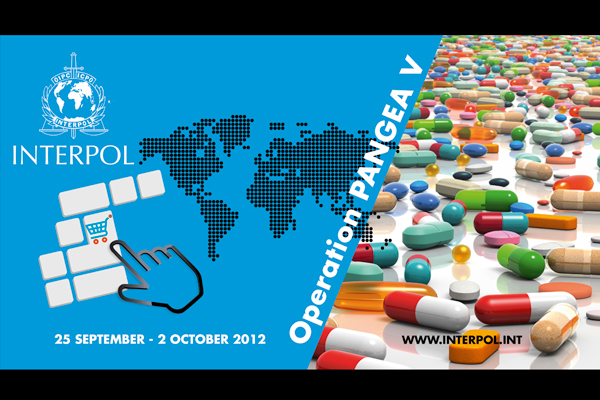Interpol and the World Customs Organisation have spearheaded an international effort to shut down internet websites suspected of illegally selling anabolic steroids, erectile dysfunctions medications and diet pills. The crackdown occurred between September 25th and October 2, 2012.
The operation was codenamed Pangea V and involved over eighty countries around the world including the United States Food and Drug Administration (FDA), United Kingdom’s Medicines and Healthcare Products Regulatory Agency (MHRA) and Australia’s Customs and Border Protection and the Therapeutic Goods Administration (TGA).
“Over 20,000 illicit pharmacies have been shut down, as well as seizure of over 3,002,000 medicines. Over 80 investigations [are] ongoing and 70 persons [were] arrested,” according to Aline Plançon, Interpol’s anti-pharmaceutical crime chief. “Organized criminals are definitely part of these illicit sales online and they are transnational people, well organized over the continents.”
Only seventy people were arrested worldwide. Customs agents seized 133,000 packages containing over 3 million doses of unlicensed pills worldwide. But the big news involved the number of websites that were shut down and the methods the government used to take control of the domains.
Approximately 18,000 internet pharmacies were taken offline as a result of Operation Pangea V. Only a small percentage of the internet pharmacies specialized in the sale of anabolic steroids, human growth hormone (hGH) and other performance-enhancing drugs (PEDs). Most of the websites involved sold a variety of medications including antibiotics, antidepressants, high blood pressure, cholesterol and diabetes medications.
The websites were shutdown after government regulators contacted domain registrars and/or payment processors rather than taking legal action against the operators of such websites.
In the United States, the FDA sent warning letters directly to the internet pharmacies. Then the FDA contacted the internet service providers hosting the websites. And finally they contacted domain name registrars in order to take possession of the domain names.
The U.S. Immigration and Customs Enforcement (ICE) together with the U.S. Department of Justice seized a total of 686 websites accused of selling illegal medications such as steroids. The domain name seizures were part of a broader program called “Operation In Our Sites”.
Australia’s TGA worked with a domain name registrar in Brisbane to seize over 120 domain names associated with international internet pharmacies.
Civil liberties groups have been highly critical of the federal government’s domain seizure initiative. They have accused the government of ignoring due process and first amendment rights of internet domain owners.

Source:
Euronews. (October 4, 2012). Interpol global drug bust. Retrieved from http://www.euronews.com/2012/10/04/interpol-global-drug-bust/
Gross, G. (October 4, 2012). US agencies seize 686 websites accused of selling fake drugs. Retrieved from http://www.computerworld.com/s/article/9232066/US_agencies_seize_686_websites_accused_of_selling_fake_drugs
Related Posts :
- Federal Crackdown on Chinese hGH Leads to Huge Profits for Big Pharma
- Steroid Dealer Goes to Prison With Father on Deathbed
- New York Court of Appeals Rules That Signature Pharmacy Steroid Scandal Still Not Over
- Canadian Drug Bust Seizes Anabolic Steroids and hGH Along With Other Recreational Drugs

